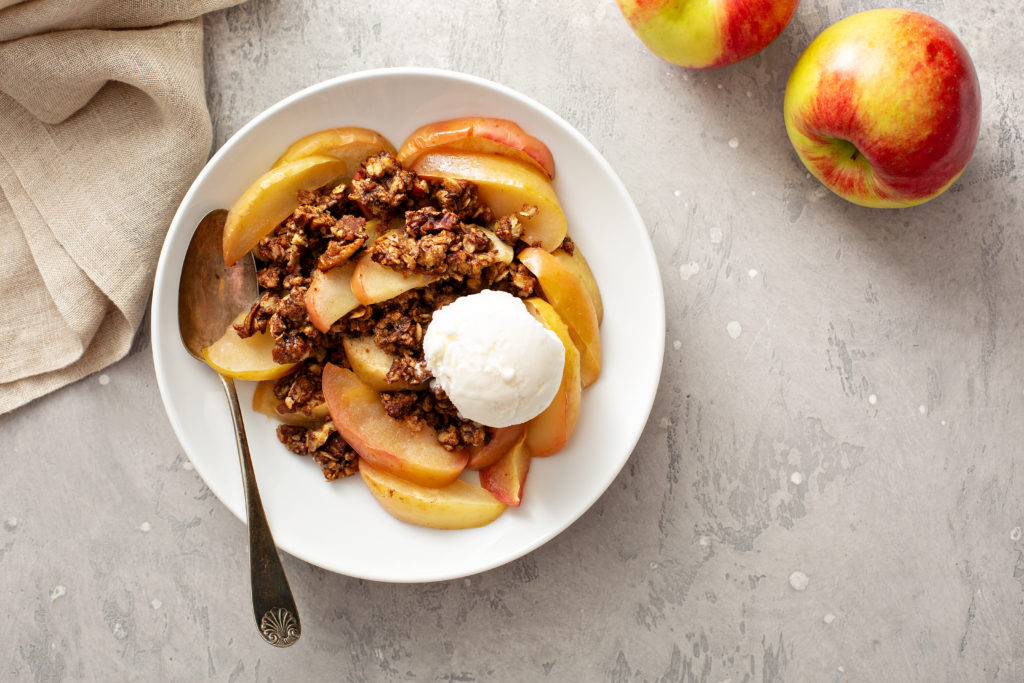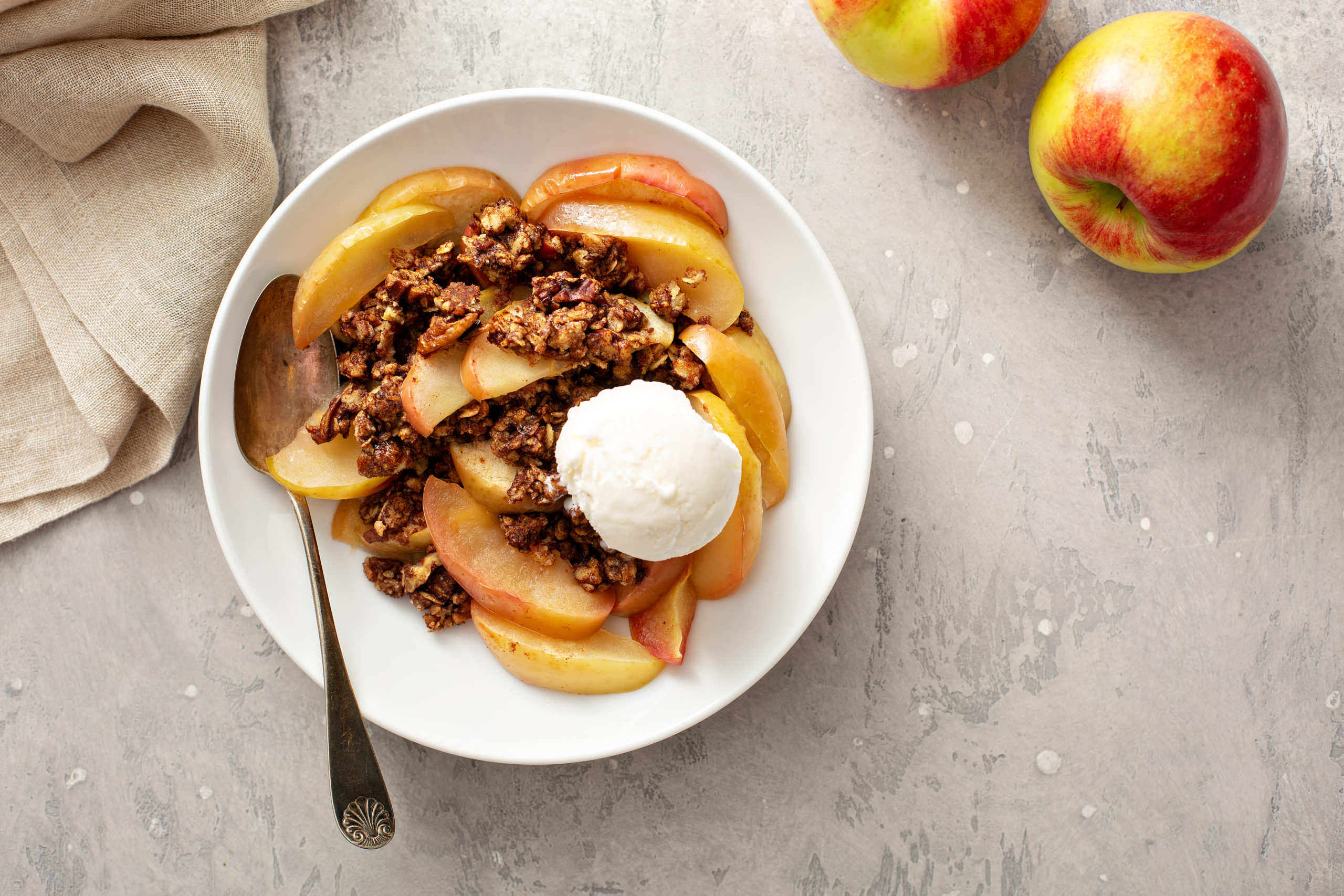An unhealthy diet is one of the main lifestyle factors that can increase your risk of cardiovascular disease (CVD). Foods that can contribute to heart disease include items high in saturated fat, trans fat, cholesterol, sodium, and sugar.
On the flip side, a heart healthy diet can lower your risk of heart disease. This type of diet includes plenty of fiber, antioxidant-rich foods, and healthy fats and can help support cholesterol levels, blood pressure, and overall heart health.
Eating for heart health is a lifelong commitment with major health benefits, but many people find themselves sidetracked from healthy habits during holidays and special occasions. From calendars filled with holidays events to spreads full of indulgent foods, holidays can make it more challenging to stick to our health goals.
In this article, I’m sharing my best holiday tips to help you plan a heart healthy holiday menu. Keep reading to learn:
- Which holiday foods are good for your heart and which to limit
- Easy holiday ingredient swaps to make healthy holiday recipes
- Ideas for heart healthy desserts
Heart Healthy Holiday Foods
The first step to eating and cooking for heart health during holidays is knowing the basics of a heart healthy diet.
The best diet for your heart focuses on foods that are nutrient-rich, providing essential vitamins, minerals, antioxidants, fiber, lean protein, and healthy fats. Many heart healthy foods help to combat oxidative stress and inflammation, which contribute to cellular damage and are considered one of the root causes of cardiovascular disease.
High fiber diets are linked to a decreased risk of CVD thanks to the cholesterol-lowering effect of soluble and insoluble fiber. Healthy fats include mono- and polyunsaturated fats and omega-3 fatty acids, which decrease CVD risk by supporting healthy blood vessel lining.
A heart healthy kitchen should be stocked with:
- Beans and legumes
- Fatty fish, like sardines and salmon, which is a good source of omega-3 fatty acids
- Fermented foods, including plain yogurt, kefir, and sauerkraut,, for probiotics
- Fresh or frozen fruits and vegetables
- Nuts and seeds, especially chia seeds, flaxseed, and walnuts which contain alpha-linolenic fatty acids
- Avocado and olive oils, which are a source of unsaturated fats
- Whole grains
Foods high in cholesterol, saturated fat, trans fat, sugar, and/or sodium should be limited or avoided for heart health. These foods contribute to heart disease by increasing cholesterol, blood pressure, and/or contribute to insulin resistance.
Foods to limit or avoid include:
- Alcohol
- Butter
- Coconut oil
- Lard
- Processed & cured meats, like pepperoni, prosciutto, bacon, etc.
- Red meat
- Shortening
- Sugar sweetened beverages
- Sweets and baked goods
Let’s explore how you can include more heart healthy ingredients in your holiday menu.
Heart Healthy Holiday Recipes
Here are some easy heart healthy holiday ingredient swaps that can help you create healthy holiday recipes.
Meat/Protein
Roasted chicken and turkey breast are lean proteins that contain less saturated fat than red meat and are lower in sodium than ham and other processed meats. Roast them with avocado oil instead of butter and enjoy them without the skin to reduce saturated fat intake. Baked, grilled, or broiled seafood and fish are also heart healthy protein choices.
If you choose to go completely vegan, that is also a heart healthy option, just be sure to balance your plate with adequate lean plant based protein to allow for satiety, and supplement nutrients that are unavailable on a vegan diet. Work with a registered dietitian nutritionist who specializes in heart disease to ensure a nutrient sufficient, heart healthy vegan diet is implemented for optimal heart health and longevity.
Casseroles
Sides made with butter, cream, and cheese are often high in calories, saturated fat, cholesterol, and sodium. Instead of mashing potatoes with butter and cream, try olive oil and vegetable broth to reduce saturated fat and cholesterol.
Crisp-tender roasted vegetables can be a delicious alternative to casseroles like green bean casserole and au gratin dishes. Try roasting brussels sprouts, green beans, broccoli, or even potatoes with a bit of heart healthy oil, garlic, and fresh herbs for a flavor-packed side. For a little crunch and healthy fat, add some slivered almonds, chopped walnuts, or pine nuts.
Stuffing
Increase the fiber in your holiday menu by swapping bread in stuffing for a whole grain, such as wild rice, farro, or barley. Studies have found individuals who eat more whole grains have a reduced risk of CVD.
Desserts
Traditional baked goods are not advised on a regular basis because most are made with unhealthy fats like butter or shortening, are high in sugar, and lack fiber. The good news is heart healthy desserts are easy to make once you know a few healthy baking tricks.
- Bake with whole grains.
Whole grains contain more fiber than refined grains. You can replace half the amount of all-purpose flour in most baked goods with whole wheat flour without affecting the end result.
You can also replace one-quarter to one-third of all-purpose flour with rolled oats. Alternatively, you can replace all of the flour with an equal amount of ground oat flour.
- Go egg-free.
Replace eggs in baked goods with chia seed or flaxseed to reduce cholesterol and add soluble fiber and alpha-linolenic acid, a plant based omega-3. Simple mix 1 tablespoon of either chia seeds or ground flaxseed with 3 tablespoons of water and let the mixture stand for 5 to 10 minutes to thicken. Then, add to your baked goods in place of egg.
- Replace fat with fruit.
Fats create a tender crumb in baked goods. You can drastically reduce fat without skimping on moisture by replacing some or all of the fat with pureed fruits. Applesauce and mashed bananas are popular choices which also add some sweetness and fruit flavor to the final product. You can also use mashed pumpkin puree or pureed prunes.
- Choose dark chocolate.
Dark chocolate chips and chunks contain less sugar than milk or semi-sweet and more flavonoids which may protect against oxidative stress and heart disease. Chocolates with high cocoa percentages contain the most flavonoids.
Heart Healthy Desserts

Homemade beats store-bought when it comes to heart healthy and low sodium desserts. Here are some heart healthy desserts to inspire you
Enjoy the flavor of gingerbread without any added sugar or sodium. This no-bake recipe is naturally sweetened with dates and contains nuts and hemp seeds for a dose of heart healthy monounsaturated fats.
Fruit crisps are a good alternative to pies and other flaky pastries made with butter and shortening. You can make a heart healthy crumble topping, like the one in this recipe, from nuts, seeds, and rolled oats. This recipe calls for plant-based spread instead of butter which reduces saturated fat and cholesterol, but be sure to choose a brand that doesn’t contain any hydrogenated oils which are a source of saturated and trans fats.
Since fruit contains natural sugars, it’s easy to make fruit desserts with less added sugar than other baked goods. These baked pears are filled with cranberries, pecans, honey, and warming cinnamon and nutmeg. To add a nice crunchy topping, consider adding rolled oats to the inside of the pear before baking.
If you don’t have time to cook, fresh or dried fruit can be served on its own as a naturally sweet and low sodium dessert option. To make it special for the holidays, try dipping your favorite fruits in melted dark chocolate.
Individualized Support for Heart Healthy Holidays
It’s one thing to know which foods support heart health and another to implement daily habits and meal plans that create a heart healthy lifestyle year round — holidays included. Customized counseling that respects individual preferences, challenges, and goals can help you make lasting change.
Holidays present an opportunity to expand your heart healthy lifestyle and create new traditions around food. Holiday feasts can be delicious, celebratory, and heart healthy with just a few tweaks.
As a cardiology dietitian, I can help you approach the holidays with intention, teach you how to plan a heart healthy holiday menu, and help you navigate holiday spreads to make the healthiest choices. I’m here to offer education, support, and accountability not only during the holidays but all year round.
Schedule your free 15-minute consultation today or learn more about my group program offerings.
Be sure to join my email list for more heart disease prevention tips.
References
- Casas, R., Castro-Barquero, S., Estruch, R., & Sacanella, E. (2018). Nutrition and Cardiovascular Health. International journal of molecular sciences, 19(12), 3988. https://doi.org/10.3390/ijms19123988
- Dubois-Deruy, E., Peugnet, V., Turkieh, A., & Pinet, F. (2020). Oxidative Stress in Cardiovascular Diseases. Antioxidants (Basel, Switzerland), 9(9), 864. https://doi.org/10.3390/antiox9090864
- Soliman G. A. (2019). Dietary Fiber, Atherosclerosis, and Cardiovascular Disease. Nutrients, 11(5), 1155. https://doi.org/10.3390/nu11051155
- Sacks, F. M., Lichtenstein, A. H., Wu, J. H. Y., Appel, L. J., Creager, M. A., Kris-Etherton, P. M., Miller, M., Rimm, E. B., Rudel, L. L., Robinson, J. G., Stone, N. J., Van Horn, L. V., & American Heart Association (2017). Dietary Fats and Cardiovascular Disease: A Presidential Advisory From the American Heart Association. Circulation, 136(3), e1–e23. https://doi.org/10.1161/CIR.0000000000000510
- Jain, A. P., Aggarwal, K. K., & Zhang, P. Y. (2015). Omega-3 fatty acids and cardiovascular disease. European review for medical and pharmacological sciences, 19(3), 441–445.
- Anand, S. S., Hawkes, C., de Souza, R. J., Mente, A., Dehghan, M., Nugent, R., Zulyniak, M. A., Weis, T., Bernstein, A. M., Krauss, R. M., Kromhout, D., Jenkins, D. J. A., Malik, V., Martinez-Gonzalez, M. A., Mozaffarian, D., Yusuf, S., Willett, W. C., & Popkin, B. M. (2015). Food Consumption and its Impact on Cardiovascular Disease: Importance of Solutions Focused on the Globalized Food System: A Report From the Workshop Convened by the World Heart Federation. Journal of the American College of Cardiology, 66(14), 1590–1614. https://doi.org/10.1016/j.jacc.2015.07.050
- Aune, D., Keum, N., Giovannucci, E., Fadnes, L. T., Boffetta, P., Greenwood, D. C., Tonstad, S., Vatten, L. J., Riboli, E., & Norat, T. (2016). Whole grain consumption and risk of cardiovascular disease, cancer, and all cause and cause specific mortality: systematic review and dose-response meta-analysis of prospective studies. BMJ (Clinical research ed.), 353, i2716. https://doi.org/10.1136/bmj.i2716
- Aune, D., Keum, N., Giovannucci, E., Fadnes, L. T., Boffetta, P., Greenwood, D. C., Tonstad, S., Vatten, L. J., Riboli, E., & Norat, T. (2016). Whole grain consumption and risk of cardiovascular disease, cancer, and all cause and cause specific mortality: systematic review and dose-response meta-analysis of prospective studies. BMJ (Clinical research ed.), 353, i2716. https://doi.org/10.1136/bmj.i2716
